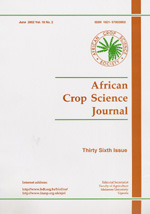
|
African Crop Science Journal
African Crop Science Society
ISSN: 1021-9730
EISSN: 1021-9730
Vol. 9, No. 1, 2001, pp. 59-66
|
 Bioline Code: cs01035
Bioline Code: cs01035
Full paper language: English
Document type: Research Article
Document available free of charge
|
|
|
African Crop Science Journal, Vol. 9, No. 1, 2001, pp. 59-66
| en |
Tropical Potato Clones with Larger Canopies Do Not Affect the Growth, Yield and Yield Components of Intercropped Sugar Cane
Cadersa, Y.; Cheong, K. Wong Yen & Govinden, N.
Abstract
About 80% of the potato produced in Mauritius comes from an intercrop with
sugarcane. Recently, several new tropical clones with higher yields have been
proposed to growers. Since their higher yields are associated with larger canopies,
five trials were conducted in 1997 and 1998 to investigate whether the new clones
affect the yield and yield components of intercropped cane. Percent and duration
of canopy cover of tropical clones were significantly higher than those of traditional
temperate clones. Canopy cover was also higher in intercropping than in pure
stands.The potato had no significant effect on tiller density, number of millable
cane, sucrose content, cane and sugar yield of intercropped cane. There were
no relationships between either potato canopy cover duration or potato yield
and relative cane yield. This confirms that even potato with larger canopies
and higher yields do not affect intercropped cane growth and yield.
Keywords
Mauritius, potato/sugarcane intercrop, sucrose content, tiller density
|
| |
| fr |
Cadersa, Y.; Cheong, K. Wong Yen & Govinden, N.
Résumé
Environ 80% de la production de pomme de terre au Maurice provient de la culture
intercalaire de la canne à sucre. Récemment, plusieurs clones
tropicaux ayant de meilleurs rendements ont été proposés
aux planteurs. Comme ces rendements elevés étaient associés
à un plus grand développement foliaire, cinq essais ont été
plantés en 1997 et 1998 pour déterminer si ces nouveaux clones
tropicaux avaient des effets sur la canne à sucre en culture intercalaire.
La couverture du sol des clones tropicaux et leur cycle étaient supérieurs
à ceux des clones traditionnels des climats temperés. La couverture
du sol était aussi supérieure en intercalaire qu'en culture pure.
La pomme de terre n'a pas eu d'effets sur le tallage, le nombre de tiges usinables,
la teneur en sucre et le rendement en canne et en sucre. Il n'y a pas eu de
relation entre le rendement relatif de la canne, d'une part, et la durée
de la couverture foliaire du sol et le rendement de la pomme de terre, d'autre
part. Ces résultats démontrent qu'en dépit d'un plus grand
développement foliaire et de meilleurs rendements, les nouvelles variétés
de pomme de terre d'origine tropicale n'affectent pas la canne à sucre
en intercalaire.
Mots Clés
Ile Maurice, canne à sucre, culture intercalaire, pommes de terre, tallage, teneur en sucre
|
| |
© Copyright 2001 - African Crop Science Society
|
|
